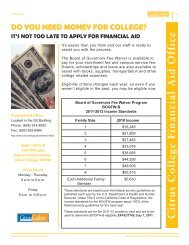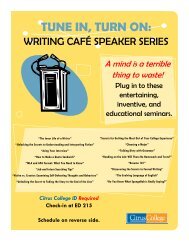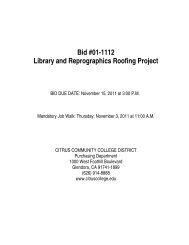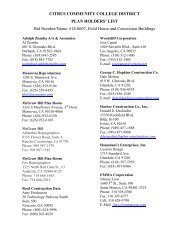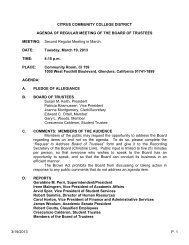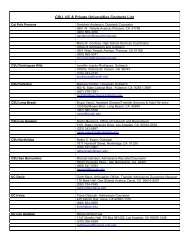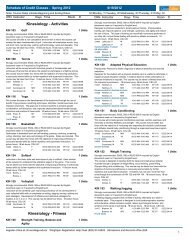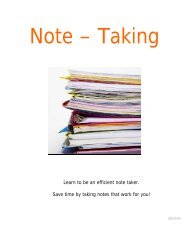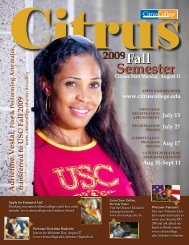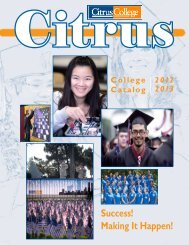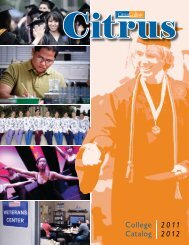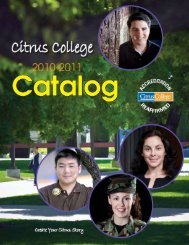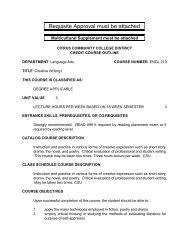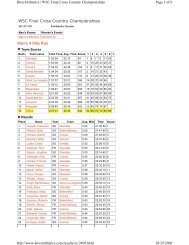Citrus College Catalog 2009-2010 (ver. 10/22
Citrus College Catalog 2009-2010 (ver. 10/22
Citrus College Catalog 2009-2010 (ver. 10/22
You also want an ePaper? Increase the reach of your titles
YUMPU automatically turns print PDFs into web optimized ePapers that Google loves.
students for ASE Electrical and Electronic<br />
Systems (A6) certification. 36 lecture<br />
hours, 54 lab hours.<br />
AUTO 167<br />
Automotive HVAC Service, Diagnosis<br />
& Repair<br />
3 Units<br />
Prerequisite: AUTO <strong>10</strong>1.<br />
Strongly recommended: READ 099 if<br />
required by reading placement exam<br />
or if required by reading level.<br />
Also, Auto 156 and MATH 129 or<br />
higher and ENGL <strong>10</strong>0 or higher.<br />
Intended for those seeking a career in the<br />
automotive service and repair industry.<br />
This National Automotive Technicians' Education<br />
Foundation certified course is one<br />
component of the Toyota Technical Education<br />
Network and Technicians' Education<br />
Cooperative programs. This class co<strong>ver</strong>s<br />
essential heating, ventilation and air conditioning<br />
system theory, along with inspection,<br />
diagnosis, service and repair of<br />
specific HVAC subsystems including: refrigeration,<br />
air distribution and automatic<br />
temperature control. This course prepares<br />
students for ASE Heating and Air Conditioning<br />
(A7) certification. 36 lecture hours,<br />
54 lab hours.<br />
AUTO 168<br />
Engine Control Systems Service,<br />
Diagnosis and Repair<br />
8 Units<br />
Prerequisite: AUTO <strong>10</strong>1.<br />
Strongly recommended: READ 099 if<br />
required by reading placement exam<br />
or if required by reading level.<br />
Also, AUTO 151 and MATH 129 or<br />
higher and ENGL <strong>10</strong>0 or higher.<br />
Intended for those seeking a career in the<br />
automotive service and repair industry.<br />
This National Automotive Technicians' Education<br />
Foundation certified course is one<br />
component of the Toyota Technical Education<br />
Network and Technicians' Education<br />
Cooperative programs. The course co<strong>ver</strong>s<br />
essential engine management systems<br />
theory, along with inspection, diagnosis,<br />
service and repair of the following systems:<br />
ignition, air and fuel deli<strong>ver</strong>y, electronic<br />
engine controls, and auxiliary<br />
emission controls. This course prepares<br />
students for ASE Engine Performance (A8)<br />
certification. <strong>10</strong>8 lecture hours, 135 lab<br />
hours.<br />
AUTO 190<br />
Introduction to Compressed Natural<br />
Gas Vehicles<br />
3 Units Grade or P/NP<br />
Strongly recommended: READ 099 if<br />
required by reading placement exam<br />
or if required by reading level.<br />
This course introduces students to the<br />
role, function, and application of compressed<br />
natural gas (CNG) as an alternative<br />
fuel for today's internal combustion<br />
engine. Propane, methanol, hydrogen, fuel<br />
cells and electric vehicles are also discussed.<br />
Course prepares students to take<br />
the ASE F1 exam. 54 lecture hours.<br />
AUTO 230A<br />
Automotive Service and Repair Work<br />
Experience A<br />
1 Unit P/NP<br />
Recommended Skill: AUTO <strong>10</strong>1, 151,<br />
154, 156, 162, 166, 167, and 168<br />
SLOs.<br />
Strongly recommended: Completion<br />
of 16 units in automotive technology<br />
coursework. Limitation on Enrollment:<br />
Department consent required<br />
prior to enrollment.<br />
Automotive technology work experience is<br />
designed to extend occupational learning<br />
through employment and coordinate the<br />
on-the-job training with program instruction.<br />
Individual student goals and learning<br />
objectives will be designed by the student<br />
cooperatively with the employer and faculty<br />
adviser. Lab hours are arranged and<br />
completed at the place of employment.<br />
This AUTO 230A course may be taken four<br />
times for a maximum of four units. P/NP<br />
grading only. 9 lecture hours, 160 lab<br />
hours.<br />
AUTO 230B<br />
Automotive Service and Repair Work<br />
Experience B<br />
2 Units P/NP<br />
Recommended Skill: AUTO <strong>10</strong>1, 151,<br />
154, 156, 162, 166, 167, and 168<br />
SLOs.<br />
Strongly recommended: Completion<br />
of 16 units in automotive technology<br />
coursework. Limitation on Enrollment:<br />
Department consent required<br />
prior to enrollment.<br />
Automotive technology work experience is<br />
designed to extend occupational learning<br />
through employment and coordinate the<br />
on-the-job training with program instruction.<br />
Individual student goals and learning<br />
objectives will be designed by the student<br />
cooperatively with the employer and faculty<br />
adviser. Lab hours are arranged and<br />
completed at the place of employment.<br />
This AUTO 230B course may be taken four<br />
times for a maximum of four units. P/NP<br />
grading only. 9 lecture hours, 320 lab<br />
hours.<br />
AUTO 230C<br />
Automotive Service and Repair Work<br />
Experience C<br />
3 Units P/NP<br />
Recommended Skill: AUTO <strong>10</strong>1, 151,<br />
154, 156, 162, 166, 167, and 168<br />
SLOs.<br />
Strongly recommended: Completion<br />
of 16 units in automotive technology<br />
coursework. Limitation on Enrollment:<br />
Department consent required<br />
prior to enrollment.<br />
Automotive technology work experience is<br />
designed to extend occupational learning<br />
through employment and coordinate the<br />
on-the-job training with program instruction.<br />
Individual student goals and learning<br />
objectives will be designed by the student<br />
cooperatively with the employer and faculty<br />
adviser. Lab hours are arranged and<br />
completed at the place of employment.<br />
This AUTO 230C course may be taken four<br />
times for a maximum of four units. P/NP<br />
grading only. 9 lecture hours, 480 lab<br />
hours.<br />
AUTO 230D<br />
Automotive Service and Repair Work<br />
Experience D<br />
4 Units P/NO<br />
Recommended Skill: AUTO <strong>10</strong>1, 151,<br />
154, 156, 162, 166, 167, and 168<br />
SLOs.<br />
Strongly recommended: Completion<br />
of 16 units in automotive technology<br />
coursework. Limitation on Enrollment:<br />
Department consent required<br />
prior to enrollment.<br />
Automotive technology work experience is<br />
designed to extend occupational learning<br />
through employment and coordinate the<br />
on-the-job training with program instruction.<br />
Individual student goals and learning<br />
objectives will be designed by the student<br />
cooperatively with the employer and faculty<br />
adviser. Lab hours are arranged and<br />
completed at the place of employment.<br />
This AUTO 230D course may be taken four<br />
times for a maximum of four units. P/NP<br />
grading only. 9 lecture hours, 640 lab<br />
hours.<br />
AUTO 245<br />
Auto Service Management<br />
3 Units<br />
Strongly recommended: READ 099 if<br />
required by reading placement exam<br />
or if required by reading level.<br />
Also, AUTO <strong>10</strong>0 and AUTO 145.<br />
Course focuses on the management skills<br />
required for automotive service managers.<br />
Course includes but is not limited to: Compensation<br />
plans, importance of customer<br />
service, staff organization, evaluations, job<br />
descriptions, employee regulations and<br />
go<strong>ver</strong>nment agencies, shop planning,<br />
equipment, scheduling, and training considerations.<br />
54 lecture hours.<br />
AUTO 260<br />
Engine Design<br />
6 Units Grade or P/NP<br />
Strongly recommended: READ 099 if<br />
required by reading placement exam<br />
or if required by reading level.<br />
A course designed to teach engine design<br />
and analysis of cylinder heads, cylinder<br />
blocks, crankshafts, piston and rings, connecting<br />
rods, camshaft, valve train systems.<br />
The course will also co<strong>ver</strong> the<br />
design and tuning of intake and exhaust<br />
CITRUS COLLEGE CATALOG <strong>2009</strong> • <strong>20<strong>10</strong></strong> www.citruscollege.edu 123



